|
|
|
Sort Order |
|
|
|
Items / Page
|
|
|
|
|
|
|
| Srl | Item |
| 1 |
ID:
146639
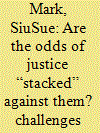

|
|
|
|
|
| Summary/Abstract |
In 2012, the Government of Myanmar passed the Farmland Law and the Vacant, Fallow, Virgin Land Law, with an aim to increase investment in land through the formalization of a land market. Land titling is often considered “the natural end point of land rights formalization.”1 A major obstacle to achieving this in Myanmar is its legacy of multiple regimes which has created “stacked laws.”2 This term refers to a situation in which a country has multiple layers of laws that exist simultaneously, leading to conflicts and contradictions in the legal system. This ambiguity is often manipulated by those who have more access to political and economic resources, particularly those who received large land concessions under the 1988–2010 military regime. In this context, this paper attempts to answer the question: In Myanmar, how do smallholder farmers engage with a stacked legal framework, which is ambiguous and unfairly applied, to defend themselves against land dispossession? The analysis seeks to contribute to the literature on the contest over land control and access through an analysis of how a stacked legal framework can be used to further disenfranchise farmers by elites, or on the contrary, by farmers to gradually reclaim this control through strategic political
|
|
|
|
|
|
|
|
|
|
|
|
|
|
|
|
| 2 |
ID:
146636
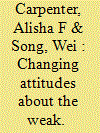

|
|
|
|
|
| Summary/Abstract |
The foundation of current legal protection for animals in China is based on the principle of “rational utilization.” This utilitarian attitude supports the exploitation of animals through the legal means of resource management. However, through a process of public education and the construction of recent legislation, attitudes toward animals are rapidly changing in China. After the introduction of the concept of animal welfare in China in 1989, preliminary socioeconomic events such as early laboratory animal science, animal cruelty reports, pet ownership, engagement in international trade, and the severe acute respiratory syndrom (SARS) epidemic helped spur a trend away from a purely utilitarian attitude toward more positive associations with animals among members of the Chinese public. This phenomenon will be analyzed through the actions of non-governmental organizations, the media, academia, and international business to influence education and the development of legislation to promote animal protection practices. In addition, recent events will be used to illustrate political realities in China that impede the full promotion of animal welfare protection.
|
|
|
|
|
|
|
|
|
|
|
|
|
|
|
|
| 3 |
ID:
146635
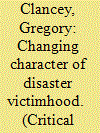

|
|
|
|
|
| Summary/Abstract |
Japan is periodically wracked by “Great Earthquakes” (daijishin) – seismic events so destructive that they leave massive amounts of textual and graphic evidence, much of it produced by people who did not experience the events directly. Using this cache of information, it is possible to see how the idea of the “disaster victim” has changed over time and circumstance. My paper traces this role across five Great Earthquakes that spanned roughly 150 years (1855–2011), a period convergent with modern Japan. I will argue that the sense of who and what has been victimized by the shaking of the earth – who has suffered, what weight to attach to their loss, what actions to take and emotions to feel regarding their situation – has changed regularly, and surprisingly, over this rather short period. There is, in other words, no common Japanese experience of victimhood, even in the context of one disaster type over a relatively short historical period. The article is one contribution to an as-yet unexamined history and comparative study of the modern role of disaster victim.
|
|
|
|
|
|
|
|
|
|
|
|
|
|
|
|
| 4 |
ID:
146634
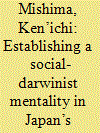

|
|
|
|
|
| Summary/Abstract |
From a historical perspective, the welfare net in Japan was established from above without democratic participation and expanded only slowly. This expansion in many cases was aimed at enhancing national cohesion, especially during war time. During the current neoliberal era, Japan’s paternalistic welfare state has been able to put into practice the dismantling of national pension and health-care systems without the need for any theoretical re-orientation. In response, counter-publics have engaged in protest and resistance. By doing so, the victims of modernization and those who are socially weak and disadvantaged in multiple ways are able to regain their self-esteem and personal integrity.
|
|
|
|
|
|
|
|
|
|
|
|
|
|
|
|
| 5 |
ID:
146637
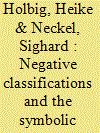

|
|
|
|
|
| Summary/Abstract |
This article explains a cultural sociological approach to research on social inequality. “Cultural sociological” means that we do not regard social inequality as resulting only from a distributive order of goods, income and positions, but also from an evaluative order created and reproduced by the actions of social groups. Concerning the topic of this thematic issue, this means that, from a sociological perspective, we see “weakness” not only as the social vulnerability of actors and groups resulting from a lack of material resources, education and power, but also as an attribution and assessment which can have a variety of social consequences. “Weakness” can compel others to help the weak and defend their interests. But if the weak are to be protected and empowered, they must be identified as “weak” in the first place, and this act of identification can have paradoxical consequences. As we demonstrate with evidence from East Asia, the social designation as “weak” can have many adverse effects for the weak groups themselves, because it blames them for their own weaknesses and publicly condemns, disparages, or stigmatizes them. Based on an analysis of the situation of victims of the Fukushima disaster in Japan and of rural migrants and their offspring living in Chinese metropoles, we show how social designations of weakness can produce negative classifications that signal disrespect to weak actors and limit their opportunities for action.
|
|
|
|
|
|
|
|
|
|
|
|
|
|
|
|
| 6 |
ID:
146638


|
|
|
|
|
| Summary/Abstract |
In the spring of 2010, the strike of the Honda workers in Nanhai instigated an on-going discourse on the “rights awakening” of the “new generation of migrant workers.” Since then, much has been written about these young workers, generally described as more pro-active and ready to stand up against their employers than the older and more subservient generation. Drawing from statistical findings from two factory-gate surveys in the metal mechanics and garment sectors in Shenzhen, this paper tests two hypotheses: (a) that workers of the younger generation are more cognizant of their legal rights than older workers; (b) that the younger generation wants to work fewer hours and to enjoy life more. We argue that this popular image of the younger generation of migrant workers is one-dimensional and reductive, as it focuses only on generational differences as an explanatory factor for worker activism, while ignoring other issues such as types of industries and payment systems. In this paper, we purport that these elements play important roles in shaping the attitude of this younger generation toward their work and rights.
|
|
|
|
|
|
|
|
|
|
|
|
|
|
|
|
| 7 |
ID:
146633
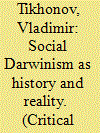

|
|
|
|
|
| Summary/Abstract |
By the time of Korea’s forced integration into the Japanese Empire in 1910, Social Darwinism was established as the main reference frame for the modernizing intellectual elite. The weak had only themselves to blame for their misfortune, and Korea, if it wished to succeed in collective survival in the modern world’s Darwinist jungles, had to strengthen itself. This mode of thinking was inherited by the right-wing nationalists in the 1920s–1930s; their programs of “national reconstruction” (minjok kaejo) aimed at remaking weak Korea into a “fitter” nation, thus preparing for the eventual independence from the Japanese. At the same time, in the 1920s and 1930s some nationalists appropriated the slogan of solidarity and protection of the weak, nationally and internationally, in the course of their competition against the Left. After liberation from Japanese colonialism in 1945, “competition” mostly referred to inter-state competition in South Korean right-wing discourse. However, the neo-liberal age after the 1997 Asian financial crisis witnessed a new discursive shift, competition-driven society being now the core of the mainstream agenda.
|
|
|
|
|
|
|
|
|
|
|
|
|
|
|
|
|
|
|
|
|